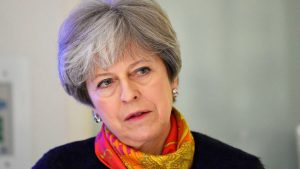


British Prime Minister Theresa May
THE UK stands at its most dangerous crossroads in decades after Parliament emphatically rejected Theresa May’s Brexit deal and left her facing an uncomfortable vote to oust her government.
The humiliating defeat on Tuesday evening, the biggest for any government in modern history, leaves May’s divorce agreement with the European Union all but dead and opposition leader Jeremy Corbyn trying to force a general election. While May believes she will survive Wednesday’s no-confidence vote, it’s unclear how long she — or her Brexit strategy — will last.
With the UK due to leave the EU in 10 weeks, there is growing alarm among British and European politicians that May will fail to end the impasse in time to avoid the potential economic catastrophe of leaving the EU without a deal. Any alternatives, including calling a second referendum, would likely require the EU to extend the March 29 departure deadline.
The prime minister said she will start cross-party talks this week to try to reach a consensus, but in such a febrile atmosphere they may already be doomed. Corbyn dismissed her offer as too little, too late.
The dramatic, if not unexpected, events in the House of Commons marked another watershed for a country that used to be a pillar of democratic stability and is now at the mercy of the divisions sown by the 2016 referendum to leave Europe’s common market after 46 years of membership.
Landslide loss
May lost the vote on approving her Brexit deal by 432 to 202. Giving her reaction afterward, she was barely able to contain her frustration.
“It is clear that the House does not support this deal,” May told the Commons. “But tonight’s vote tells us nothing about what it does support — nothing about how — or even if it intends to honor the decision the British people took in a referendum Parliament decided to hold.”
Opposition to the deal has focused on the backstop designed to keep the Irish border open in the event of no-deal, which anti-EU members of May’s Tory Party fear would permanently trap the UK in the bloc’s customs union. Members of Parliament have also objected to the size of the cash settlement for the EU and the level of access to European markets after the split.
How members of parliament voted on Theresa May’s Brexit deal
If May loses Wednesday’s no-confidence vote, Britain will be on course for its third general election in four years. Many Conservatives on her side who voted against the Brexit deal said they’d support her leadership. If everyone on her side does turn out, her margin of safety is just 13 votes.
On Tuesday night, 118 members of her party voted against her deal.
A loss like that would finish off a prime minister in normal times. But these aren’t normal times.
Stop pretending
The mood in Parliament after the vote was surprisingly upbeat. Many members have been waiting months for the chance to vote on Brexit. They were denied their moment in December, when May pulled the vote. Now, they said, May could stop pretending that her deal had a chance of passing and move to discussing more realistic options.
The first sign of this was immediately after the vote, when the prime minister bowed to pressure from cabinet colleagues and said she would open talks with opposition parties.
But Andrea Leadsom, leader of the House of Commons, made clear on Wednesday that May’s preference is to talk to senior rank-and-file Labour MPs rather than the party’s leadership. Labour’s economy spokesman John McDonnell complained the premier had not reached out to Corbyn.
“What Jeremy Corbyn wants to do is disrupt government and disrupt the nation at a crucial time by seeking a general election,” Leadsom told BBC Radio. “The prime minister will speak with senior parliamentarians across the House and seek to find a way that meets with a majority.” May’s deal is still the “basis” for reaching that consensus, she said.
Where now?
The question is what that route forward looks like. For now at least, May is sticking to the principles she’s set out already, while her aides insist that the Withdrawal Agreement she negotiated with the EU over the past two years can’t be allowed to die. While she’s not yet publicly contemplating extending the Brexit deadline, May gave a heavy hint she won’t allow the UK to crash out of the bloc.
“I have always believed that the best way forward is to leave in an orderly way with a good deal,” she said. — Bloomberg